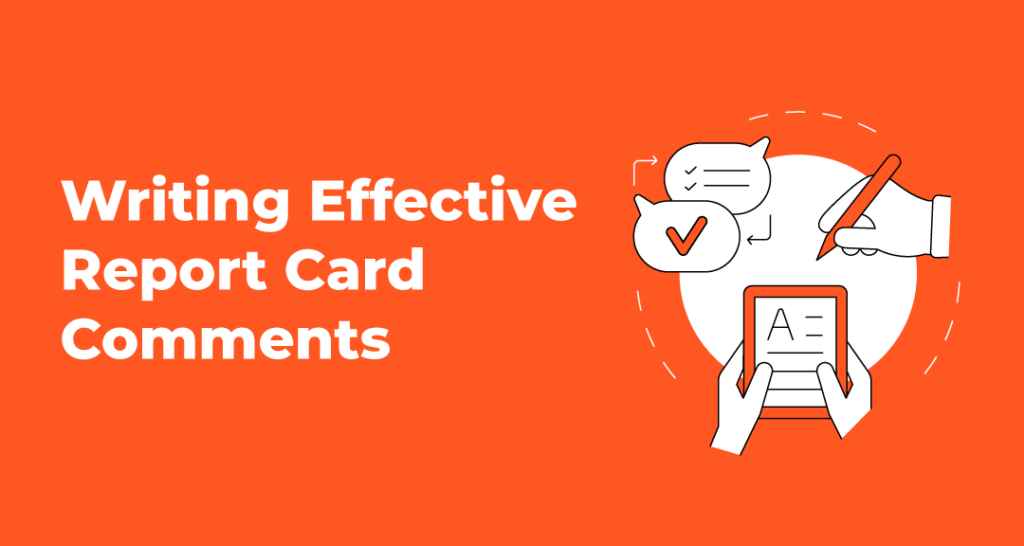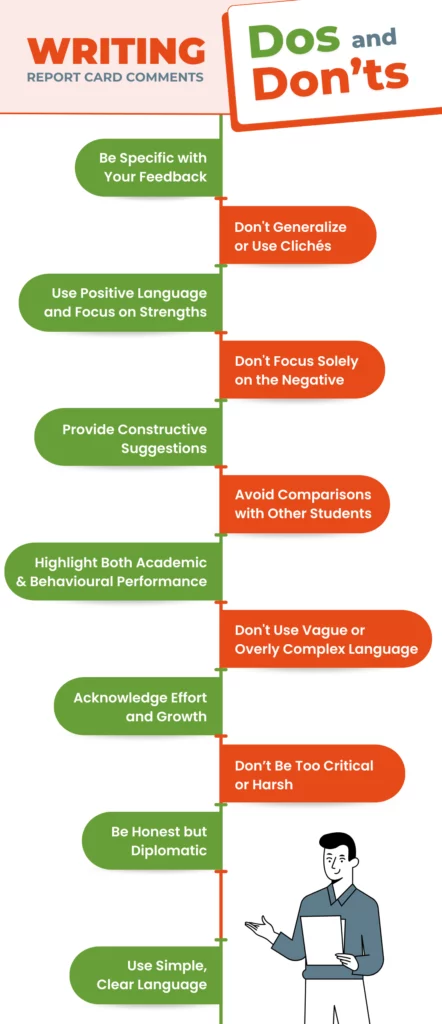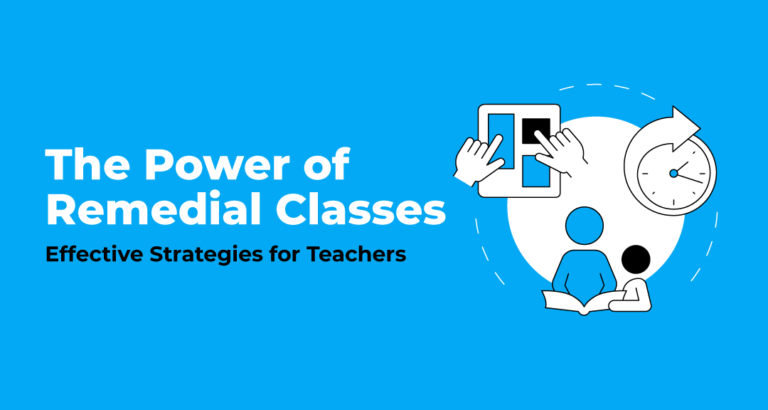Writing Effective Report Card Comments
- Teaching
- September 21, 2024
- VOLT Learning

Ah, it’s finally report card season – that time of the academic year when teachers hunker down with their grade books and countless cups of coffee. Reports are a significant responsibility for teachers because they aren’t just about exam grades – they are a crucial means of communication between teachers, students and parents.
Beyond the grades lies an equally crucial element: the comments. These brief narratives play a significant role in a student’s motivation and a parent’s understanding of their child’s progress.
The comments offer personalized insight into each student’s learning journey, so effective report card comments are crucial for guiding students, engaging parents, and ensuring students continue to grow academically and socially.
So, how can we, as teachers, ensure our comments hit the mark?
Well, there are some do’s and don’ts that teachers can consider when providing report card comments. Let’s have a closer look at some simple tips for crafting thoughtful and constructive report card comments:
Dos and Don’ts of Writing Report Card Comments

Dos:
- Be Specific with Your Feedback
Specific feedback helps students and parents understand exactly what the student excels at or needs improvement. It eliminates ambiguity and provides clear examples of behaviour, academic performance, or skills.
Example: Instead of saying, “Raj is good at math,” you can say, “Raj has demonstrated a strong grasp of algebraic concepts and applies them effectively in problem-solving tasks.”
- Use Positive Language and Focus on Strengths
Frame your comments positively, even when addressing areas where a student struggles. This encourages students to improve while maintaining their confidence.
Example: Rather than writing, “Ananya is very disorganized,” you could say, “Ananya is encouraged to work on her organizational skills, which will help her stay on top of her assignments.”
- Provide Constructive Suggestions for Improvement
Don’t just highlight the student’s shortcomings—offer practical, actionable suggestions that parents and students can follow. This shows a commitment to the student’s growth and development.
Example: “To improve her reading comprehension, Meera could benefit from reading more diverse literature and summarizing key points after each chapter.”
- Highlight Both Academic and Behavioral Performance
A well-rounded comment addresses academic performance, classroom behaviour, social skills, and engagement, giving parents a complete picture of their child’s progress.
Example: “Arjun consistently participates in class discussions and has shown great leadership during group projects.”
- Acknowledge Effort and Growth
Recognize the student’s progress, even if it’s in small steps. This motivates students to keep improving, as it highlights their hard work, not just their final results.
Example: “Though Ria finds math challenging, she has shown significant progress by putting in extra effort during after-school tutoring.”
- Be Honest but Diplomatic
Honesty is critical, but presenting challenges in a way that doesn’t discourage the student is essential. Balance criticism with optimism about their ability to improve.
Example: Instead of saying, “Siddharth doesn’t complete his homework,” try, “Siddharth is encouraged to complete his homework regularly to reinforce concepts learned in class.”
- Use Simple, Clear Language
Avoid complex educational jargon that may confuse parents. Comments should be easily understood by parents from all backgrounds. Ensure your comments provide a fair balance between strengths and areas for improvement. This helps maintain a positive outlook and doesn’t overwhelm parents or students.
Example: Instead of writing, “Priya exhibits excellent metacognitive skills,” say, “Priya is great at thinking about her own learning process and planning how to approach assignments.”
Don’ts:
- Don’t Generalize or Use Clichés
Generic comments like “Good work” or “Needs improvement” provide little insight. Personalized comments are far more valuable in giving specific feedback to both students and parents.
- Avoid: Ravi is doing fine in class.
- Instead, Say: Ravi excels in problem-solving during science experiments and asks thoughtful questions.
- Don’t Focus Solely on the Negative
Focusing only on what a student is doing wrong can demotivate them. Even when addressing an issue, try to frame it constructively.
- Avoid: Ayesha needs to pay more attention in class.
- Instead, say: Ayesha would benefit from increased focus during class activities to engage fully with the material.
- Avoid Comparisons with Other Students
Comments that compare a student’s performance to others can demoralize the student or their parents. Keep the feedback specific to the individual’s performance.
- Avoid: Rohan is not as good at English as his classmates.
- Instead, say: Rohan is encouraged to work on his spelling and grammar, and I recommend additional reading to help him improve.
- Don’t Use Vague or Overly Complex Language
Vague or technical comments confuse parents, while complex language makes it harder for them to understand how to support their child’s improvement.
- Avoid: Tara’s phonemic awareness is below average.
- Instead, say: Tara is still working on recognizing letter sounds and would benefit from practicing phonics at home.
- Don’t Be Too Critical or Harsh
While it’s important to point out areas for improvement, overly critical comments can affect the student’s confidence and the parent’s perception of the teacher.
- Avoid: Vikram is very lazy and never completes his assignments.
- Instead, say: Vikram is encouraged to manage his time better and complete his assignments promptly to keep up with the class.
20 Sample for Report Card Comments Based on Different Situations
- Aarav consistently demonstrates a firm grasp of mathematical concepts and eagerly tackles challenging problems in our CBSE curriculum.
- While Ananya struggles with Hindi comprehension, her determination to improve is evident in her daily practice.
- Dhruv’s creative writing skills have blossomed this term, particularly in using descriptive language in English compositions.
- Ishaan’s scientific curiosity shines through in class discussions and practical experiments, especially in our NCERT-based lessons.
- Kavya has shown remarkable progress in her public speaking skills, overcoming her initial shyness during morning assembly presentations.
- Arjun’s ability to collaborate effectively in group projects has dramatically enhanced his learning experience, particularly in our Social Science projects.
- Riya’s organizational skills have improved significantly, resulting in more timely submission of holiday homework and class assignments.
- Advait’s critical thinking skills are exemplary, particularly when analyzing historical events in our Indian history curriculum.
- Sia’s artistic talents are evident in her detailed and expressive artwork, especially in her Warli art projects.
- Vihaan’s perseverance in mastering new coding concepts in our Computer Science class is commendable.
- Aisha’s leadership qualities shine through in her role as class monitor and her involvement in organizing school events.
- Rohan shows a natural aptitude for languages, excelling in written and spoken Sanskrit.
- Zara’s empathy and kindness towards classmates create a positive learning environment for all, embodying our school’s values.
- Reyansh’s problem-solving skills in Physics are impressive, especially when tackling complex numerical problems in our NEET preparation classes.
- Myra’s dedication to improving her essay structure has resulted in more coherent and persuasive writing in both English and Hindi.
- Arnav’s enthusiasm for Environmental Science translates into thoughtful class discussions and eco-club activities.
- Avni’s time management skills have greatly improved, balancing multiple subjects and extracurricular activities.
- Kabir’s musical talent is evident in his performances and contributions to the school’s classical music ensemble.
- Prisha’s ability to apply mathematical concepts to real-world scenarios demonstrates a deep understanding of the subject, particularly in our Vedic Maths sessions.
- Dev’s growth mindset is apparent in his willingness to embrace challenges and learn from mistakes, especially in our competitive exam preparation classes.
10 Examples of Needs Improvement Report Card Comments
- Aadhya would benefit from more consistent completion of homework and revision exercises to reinforce classroom learning.
- Preparing questions beforehand could enhance Vivaan’s participation in class discussions, especially in our social science debates.
- Saanvi’s writing would improve with greater attention to grammar rules, particularly in English and Hindi compositions.
- Aryan needs to focus on developing better study habits to prepare more effectively for unit tests and term exams.
- Anvi should work on staying on task during independent work time to increase productivity, especially during our self-study periods.
- Ayush would benefit from seeking help when he doesn’t understand a concept rather than remaining silent during doubt-clearing sessions.
- Mira needs to improve her organizational skills to keep track of assignments and exam dates across all subjects.
- Aditya’s math skills would strengthen with more practice in applying concepts to word problems, which is crucial for competitive exams.
- Ira should focus on developing her critical thinking skills by questioning and analyzing information more deeply, especially in our current affairs discussions.
- Krish needs to manage his time better during exams to ensure all questions are attempted, particularly in subjects requiring lengthy answers.
Final Thoughts
Writing effective report card comments is an art that combines insight, empathy, and clarity. By focusing on specifics, highlighting growth, and offering constructive feedback, teachers can provide valuable information that supports student progress and engages parents in their child’s education.



